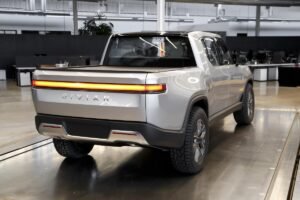
So here’s the thing: few stocks capture the imagination of both Wall Street and Main Street the way does. It’s not just another ticker symbol bouncing around on the NASDAQ. It’s a story of ambition, big promises, heavy competition, and the messy reality of trying to reinvent how we move. If you’ve ever wondered whether Rivian is the next Tesla, a passing fad, or something entirely different, this is your guide.
Let’s dig into it.
What Exactly Is Rivian Stock
At its core, {TITLE} represents Rivian Automotive, an American electric vehicle (EV) company founded in 2009 by RJ Scaringe. Rivian focuses primarily on electric trucks, SUVs, and delivery vans—vehicles that are larger, rugged, and adventure-oriented compared to the sleek sedans Tesla made famous.
Rivian’s stock went public in November 2021 under the ticker symbol RIVN. Its IPO was one of the largest in U.S. history, valuing the company at nearly $90 billion—more than legacy automakers like Ford and General Motors at the time. Investors saw Rivian as the crown jewel of the EV future.
But reality, as always, had other plans.

Why Rivian Stock Matters Today
Honestly, Rivian stock matters because it represents more than just a company. It’s a litmus test for how the EV industry evolves beyond Tesla. Rivian is trying to answer questions like:
-
Can a startup really scale in one of the hardest industries on Earth—automaking?
-
Will consumers embrace electric trucks and SUVs as much as sleek sports cars?
-
Is there room for more than one dominant EV brand?
And here’s the kicker: Rivian isn’t just about passenger vehicles. One of its biggest deals is with Amazon, which ordered 100,000 electric delivery vans. That contract alone makes Rivian a key player in commercial electrification.
Core Features, Benefits, and Insights of Rivian Stock
If you’re considering investing or just curious about Rivian’s role in the market, it helps to break things down.
| Feature | Why It Matters | Example |
|---|---|---|
| Adventure-Focused EVs | Niche market—trucks & SUVs attract outdoor lifestyle buyers. | Rivian R1T pickup, R1S SUV |
| Amazon Partnership | Secures a big commercial buyer, adds revenue stability. | 100,000 van order |
| Strong Backers | Funding from Amazon, Ford (initially), and others. | Billions raised pre-IPO |
| Cutting-Edge Tech | Long-range batteries, unique “gear tunnel” design, software-first approach. | 314+ mile range |
| Sustainability Narrative | Appeals to ESG-focused investors. | All-electric lineup |
Benefits of holding Rivian Stock:
-
Exposure to EV growth beyond Tesla.
-
Unique positioning in the truck/SUV space.
-
Backing from deep-pocketed partners.
Risks of holding Rivian Stock:
-
Still unprofitable, burning cash fast.
-
Intense competition from Ford, GM, Tesla, and startups.
-
Dependence on supply chain stability.
Case Study: Rivian’s Rollercoaster Ride
Let me paint you a picture. Imagine being an investor who bought into Rivian’s IPO at $78 a share. Within days, your stock soared past $170. You’re feeling unstoppable, like you just hit the jackpot. Fast forward a year: the stock is trading below $20. That’s not just a dip—it’s a gut punch.
And yet, Rivian kept delivering (literally). By 2024, Rivian had produced over 100,000 vehicles. The vans were hitting Amazon’s fleet. The R1T and R1S won awards and strong reviews. But the financials? Still in the red.
This rollercoaster illustrates a key truth: Rivian is simultaneously a visionary EV maker and a struggling startup trying to scale production. Both things are true at once.
Comparing Rivian Stock With Alternatives
When people talk about EV stocks, they often lump Rivian into the same sentence with Tesla, Lucid, and legacy automakers. But the comparison isn’t straightforward.
| Company | Focus | Strength | Weakness |
|---|---|---|---|
| Rivian (RIVN) | Trucks, SUVs, Vans | Adventure niche, Amazon partnership | Still unprofitable |
| Tesla (TSLA) | Sedans, SUVs, Cybertruck | Scale, profitability, brand | Polarizing leadership |
| Lucid (LCID) | Luxury sedans | Longest-range EVs | Small scale |
| Ford (F) | Mix of EVs & gas | Scale, infrastructure | Transition challenges |
| GM (GM) | EV push with Ultium platform | Legacy know-how | Slow adoption |
The takeaway? Rivian isn’t Tesla’s clone. It’s carving its own lane.
Challenges Facing Rivian Stock
Let’s not sugarcoat it. Rivian faces big problems:
-
Production Costs: Making cars is expensive. Making EVs is even harder.
-
Cash Burn: Billions are being spent every year. Investors worry about sustainability.
-
Competition: Legacy automakers can undercut prices.
-
Scaling Up: It’s one thing to make 50,000 vehicles. It’s another to make 500,000.
Possible solutions? Streamlining supply chains, expanding manufacturing capacity, and leveraging partnerships with Amazon and other fleet buyers.
Myths vs Facts AboutRivian Stock
-
Myth: Rivian is just another Tesla wannabe.
Fact: Rivian targets a different market (outdoor lifestyle, trucks, and commercial vans). -
Myth: The Amazon deal guarantees profitability.
Fact: It helps, but scaling is still a massive hurdle. -
Myth: Rivian stock is dead after the crash.
Fact: The company continues to grow production and expand internationally.
The Future Outlook for Rivian Stock
In my opinion, Rivian’s future depends on two things: scaling production and managing cash flow. If it can hit those milestones, Rivian could become a household name in the EV space.
Looking ahead:
-
Global Expansion: Rivian plans to sell in Europe and Asia.
-
New Models: Smaller, more affordable EVs are on the roadmap.
-
Battery Innovation: Longer ranges, faster charging, and cost reductions are all in progress.
By 2030, analysts suggest the EV market could quadruple. If Rivian captures even a small slice, {TITLE} could reward patient investors.
Practical Tips for Investors Interested in Rivian Stock
-
Diversify: Don’t put all your eggs in one EV basket. Pair Rivian with safer bets.
-
Watch Cash Flow: Keep an eye on Rivian’s quarterly reports.
-
Look Beyond Hype: Focus on deliveries, not headlines.
-
Set Realistic Timelines: This isn’t a short-term play it’s long haul.
Expert Perspectives on Rivian Stock
-
Dan Ives, Wedbush Analyst: Called Rivian a “key player in the EV arms race” but noted execution risks.
-
Morgan Stanley Report (2024): Highlighted Rivian’s Amazon partnership as a moat, but warned of capital intensity.
-
RJ Scaringe, CEO: Frequently emphasizes Rivian’s mission to “keep the world adventurous forever.”
FAQs About Rivian Stock
Q1: What is Rivian Stock
A:Rivian Stock refers to Rivian Automotive’s publicly traded stock under the ticker RIVN.
Q2: Is Rivian Stock a good long-term investment?
A: It depends on your risk tolerance. Rivian is still unprofitable but growing fast.
Q3: Why did {TITLE} fall so much after the IPO?
A: Overvaluation, supply chain challenges, and slower-than-expected production.
Q4: How does Rivian differ from Tesla?
A: Tesla built sedans and SUVs first, while Rivian focuses on trucks, SUVs, and vans.
Q5: Does Amazon still back Rivian?
A: Yes, Amazon remains a major partner with a large van order.
Q6: What are Rivian’s main vehicles?
A: The R1T pickup, R1S SUV, and electric delivery vans.
Q7: Can Rivian run out of money?
A: Like any startup, it’s possible. But Rivian continues to raise capital and expand.
Q8: Where can I buy Rivian Stock?
A: Rivian stock trades on the NASDAQ under ticker symbol RIVN.
Q9: What’s the 5-year outlook for Rivian Stock?
A: Analysts are mixed. Some see growth if Rivian scales, others caution about losses.
Q10: Should beginners invest in Rivian Stock ?
A: Only if they understand the risks. Rivian stock is volatile and speculative.
Conclusion: The Real Story of Rivian Stock
At the end of the day,Rivian Stock isn’t just about trucks, SUVs, or delivery vans. It’s about ambition colliding with reality. Rivian could become a leader in the EV world—or remain a cautionary tale of hype.
The truth? Nobody knows for sure. But one thing’s certain: Rivian is one of the most fascinating stocks to watch this decade.


